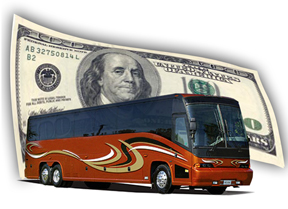
By Matthew Daecher
First, a disclaimer, which I might add is entirely appropriate for an article on legal matters: I am not an attorney, nor do I want to be an attorney. However, while I can get as frustrated as anyone over attorneys, I do have a significant amount of experience dealing with lawsuits that arise out of the transportation of goods and people.
My involvement in these litigation matters is what brings me to this topic and how it relates to coach operators and their businesses.
It is a likely assumption that because transportation providers pay a significant amount for insurance to protect their fleets in the event of an accident, the vehicles involved are indeed covered. After all, that is why operators insure their vehicles. While this assumption seems like common sense, the reality is that having insurance does not mean that the outcomes and costs of every accident are covered.
Punitive damages is a term you have likely read or heard of in describing lawsuits. They are usually lawsuits involving eye-popping monetary demands or jury awards. Typical vehicle insurance policies protect against accidents resulting from operation of an insured vehicle in most cases, but umbrella and excess policies often have exclusions against punitive damages.
Given that some portion of a motor carrier’s required face value insurance coverage may in fact be an “excess” policy, punitive damages is an important concept to understand for this simple reason: If an amount awarded is not covered by a policy, then a plaintiff has the right to attempt to collect their awarded money directly from the company.
This typically involves an asset investigation, where attorneys will determine what company-owned assets are available to satisfy the debt. What is the worth of that bus or office building you just paid off?
Punitive damages are monetary damages not necessarily for the benefit or compensation of the plaintiff. Rather, by applying an extra level of damages, they may deter a defendant’s future conduct or the future conduct of others.
Punitive damages are not easy to come by. A plaintiff must generally establish that conduct of a defendant was malicious, wanton, intentional, outrageous or reckless. Any claim nowadays involving any serious injury is almost certain to contain a punitive damage element.
Most operators trying to do the right thing have little to fear. The ultimate cause of a collision and any resulting injuries are generally not rooted in corporate behaviors that rise to the level of negligence that triggers a punitive damage award.
However, every operator and their empowered employees have likely faced decisions that could place them on the wrong side of this equation if a serious accident was to occur.
Operators should think about the big picture, especially when making those tough decisions, and even when making the simplest everyday decisions. Tough decisions are usually tough because of mixed feelings about the subject. If those mixed feelings have anything to do with safety, or compliance with regulations or policies, remember that skilled plaintiff attorneys are only a misstep away.
Matthew Daecher is president of the Daecher Consulting Group, Inc. He is a transportation safety specialist with 15 years of experience in the transportation field.
